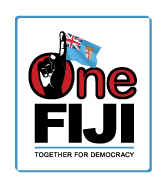For Jones to take the time to downplay information from blogs (while chastising what they do control ie the local media) in support of Bainimarama and their supporters only lends weight to what we know -- they no longer control the information that the masses have access to.
News Flash military regime: you never DID have total control over the hearts and minds of We The People.
SHARON SMITH-JOHNS
Permanent Secretary for Information, National Archives and Library Services of Fiji
‘Think Fiji First’
New Wing, Government Buildings
Tuesday. 31st May, 2011
First let me take this opportunity to thank you for your attendance.
I wish to address the issue surrounding media coverage regarding the ex soldier Ratu Tevita who is in Tonga awaiting extradition.
The media in New Zealand and to some extent Australia have helped fuel rumors regarding this person and the false accusations targeted at the Fijian Government and its citizens.
I must stress to you all that reading these anti Fiji blog sites is not a source of credible information, these sites are run by politically motivated individuals who are mostly failed politicians and a smattering of disgruntled journalists. The majority of those commenting are from overseas and not from Fiji.
These blog sites have nothing positive to contribute to the growth of Fiji. They propagate rumors and stir up emotions to destabilize this country. Suffice to say the local media have unfortunately fallen for this trap and have used false information to lend false credibility to these stories.
The media has been misled by these baseless reports and have been used as a tool to further the interests of this select group of people who have proven to be anti Fiji.
Let me draw your attention to some examples of this false reporting.
Reports have suggested that Fiji is currently under 24 hour military roadblocks and people must be very cautious when traveling to Fiji. This is totally misleading and malicious.
I also bring to your attention the recent report by a New Zealand journalist that states that Fiji will not be having elections in 2014. No one from Government made that statement, its false reporting and deliberately used to question Fiji’s commitment to holding elections. Let me state one more time, Fiji will go to elections in 2014; we have clearly said this time and again.
A direct consequence of this incorrect and unfair reporting is the upgrading of the Australian Government’s travel advisory. We all know that there are no road blocks – there is no trouble. I am sure those Australians currently on holidays in Fiji, or doing business can confirm this. The unnecessary travel advisory will not only hurt the Tourism Industry but the people of Fiji.
Why can’t journalists in Fiji counter the overseas media and correct this misreporting, why are we not doing more to stop the spread of these intentionally damaging and spiteful rumors, you ladies and gentlemen know exactly what is going on in this country, you have the tools to inform the world of what is really happening on the ground in Fiji, please use your collective power to work together to build a better Fiji.
As the case of Ratu Tevita is before the courts there will be no further comment from the Government.
Let me urge the media to stop using any anti Fiji blog sites as a credible source of information.
Let me also urge you today to put Fiji first and report in a fair and balanced way.
Lastly let me urge you to be objective and ‘THINK FIJI FIRST’.
-Ends-



